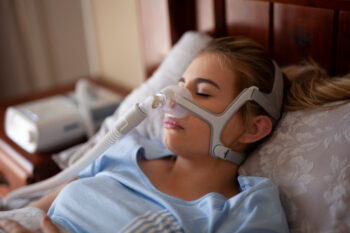Benefits Of A CPAP Chin Strap
Statistics have shown that over 80% of people are open mouth snorers. A range of CPAP (Continuous Positive Airway Pressure) supplies and masks have proven to be beneficial in treating symptoms of people who are mouth snorers, or struggle with sleep apnea and other sleep disorders and related conditions.
A range of high grade medical textiles such as hypoallergenic fabric, latex-free fabric and antibacterial fabric are used by the experts at Biomed to provide reliable, comfortable and irritation free results for all customers. Below are a few of the top questions answered to help you understand more about CPAP supplies, the role of a CPAP chin strap and the importance of high-grade medical textiles such as hypoallergenic fabric.
What is a CPAP Chin Strap?
CPAP supplies such as CPAP headgear are designed to assist with holding a sleep apnea face mask in place during the night to assist in treating sleep apnea or other sleep related conditions by limiting symptoms and providing added comfort.
A CPAP chin strap is a cloth strap that wraps around both sides the head, along the forehead and cradles the jaw to provide support during the night. A CPAP chin strap is often used to ensure that a person’s chin does not fall open during their sleep to limit symptoms such as dry mouth, jaw pain or leaking due to a CPAP mask.

Different types of CPAP Chin Straps
A range of high grade medical fabrics are used at Biomed for CPAP supplies such as hypoallergenic fabric, latex-free fabric and antibacterial. Utilising hypoallergenic fabric and a range of medical textiles ensure that the person is comfortable all night long when using the sleep mask, headgear or a CPAP chin strap, limiting the chance of skin irritation and reactions and is the most suitable fabric voice for those who suffer with allergies.
The hypoallergenic fabric which is used in the manufacturing of a CPAP chin strap is lightweight, durable, and stretchy in order to provide comfort for the person wearing it. Our range of CPAP chin straps are designed and manufactured with latex free medical grade fabric which are used in our other CPAP supplies such as headgear.
CPAP chin straps may be available in a range of other medical textiles such as neoprene or cotton, although at Biomed we utilise breathable, stretchy, and hypoallergenic fabric from Resmed as this material type is best suited for most people and skin types whilst providing the highest level of comfort.
Why Wear a CPAP Chin Strap?
There are some signs which demonstrate when a CPAP chin strap may be a beneficial addition to your CPAP supplies such as when you wake up with a dry throat or mouth, you have a high leak rate or if your jaw continuously falls open during the night.
It is important to utilise a CPAP chin strap that is comfortable and will be able to be used all night without any problems in order to get the best results from the CPAP chin strap, or CPAP therapy. The pressure that is applied by the CPAP chin strap should be enough to keep the jaw shut comfortably during the night, without adding extra pressure or providing any discomfort.
A CPAP chin strap is best used for people who experience mouth snoring, although is not best suited to people who are nose snorers, or any nasal issues such as a deviated septum as this may cause lack of oxygen being able to filter through.
To find out more about the benefits of using a CPAP chin strap, reach out to our friendly team of professionals at Biomed who are able to assist you with any questions or queries you may have and find out whether a chin strap is the best option for you and your needs!
Gain Health Benefits from a CPAP Chin Strap at Biomed!
CPAP headgear and a CPAP chin strap are effective tools for treating sleep apnea and other sleep related conditions. A CPAP chin strap is used to secure the jaw to eliminate the mouth from falling open during a person’s sleep, whilst providing a reliable, lightweight, and comfortable fit.
At Biomed, our mission as a professional fabric manufacturing company is to create and produce superior fabric manufacturing for high-quality face masks, CPAP chin straps and CPAP supplies. Therefore, we ensure our business operations always align with our ISO 13485 certification for quality management.
Our dedication to strict ISO 13485 guidelines demonstrate our products’ reliability and commitment to providing our customers superior products that offer a high level of comfort by minimising skin irritations, alongside antibacterial and hypoallergenic fabric properties for safety and comfort.
At Biomed, we have a longstanding partnership with ResMed CPAP Supplies to supply medical textiles for their products, which have offered superior patient comfort for decades. To find out more information on our full range of CPAP accessories, various face masks and other medical fabrics, please contact our team of Biomed medical fabrics and materials experts by calling (02) 9758 3855.


